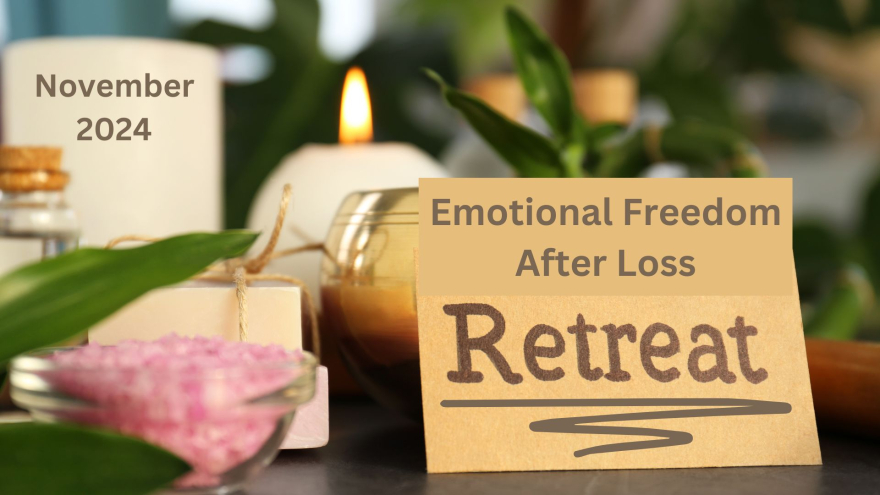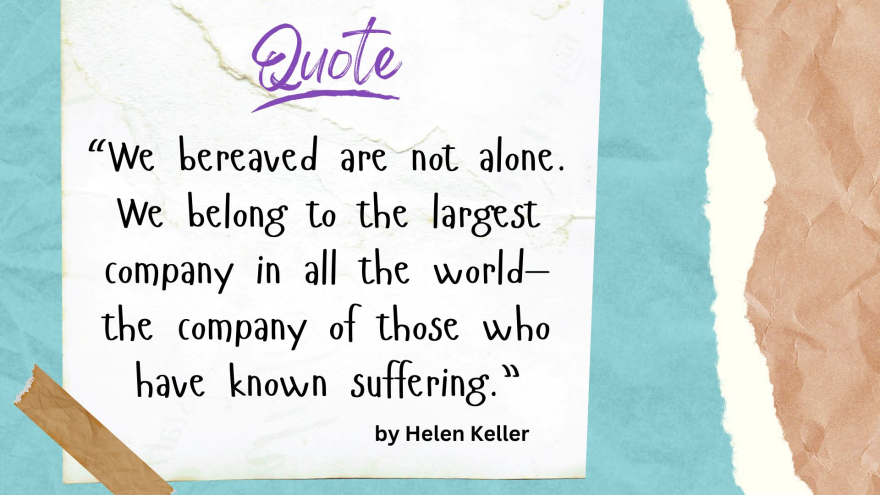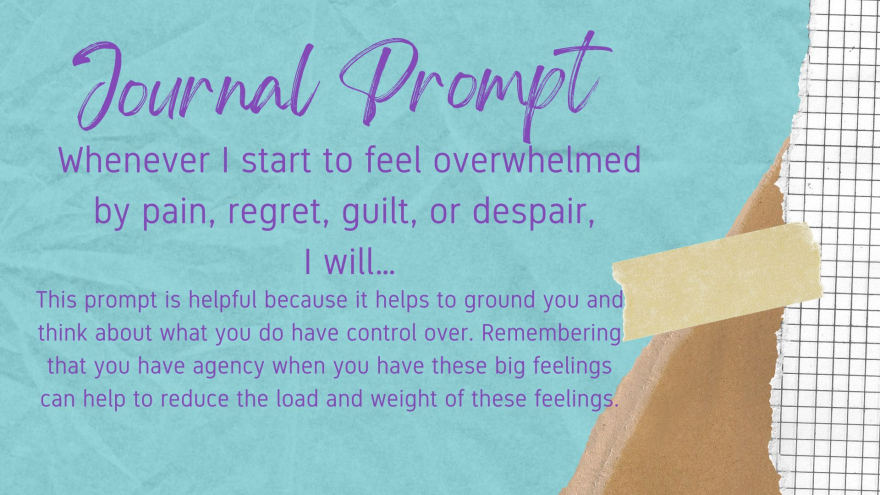|

Dear Teresa,
As we transition from July to August, I wanted to take a moment to reflect and share some valuable insight from my first solo online workshop I offered in July. It was packed with a ton of information for those that attended. One of the topics was about how to gain clarity and understanding amidst grief. For those who attended, thank you for being part of this transformative experience. I deeply appreciate your presence.
During the workshop, we delved into how to manage heightened emotions and brain fog, common experiences for anyone navigating the landscape of grief. It's important to recognize that intense emotions such as sadness, anger, guilt, and despair are normal and valid. These feelings are a natural part of grieving, and it's okay to feel this way.
When you lose someone special, it's normal to experience an emotional rollercoaster. Your emotions may fluctuate from day to day or even moment to moment. It's part of the journey, and each emotion you feel is a step towards healing.
 Upcoming Event: Upcoming Event:
In-person Women's Grief Retreat
November 22-24, 2024
Give yourself permission to step away from everyday life to explore and understand your loss, connect with others, and allow space for self-inquiry, spiritual growth, and lasting healing.
Retreat Information
Story of Strength: Emma's Journey
I'd like to share the story of my client, Emma, whose journey through grief illustrates the varied emotional landscape many of you can relate to.
Emma is a successful professional, a dedicated mother, and a beloved wife. She lost her baby to a stillbirth at 36 weeks. The loss was sudden and devastating, turning her world upside down. Her journey through grief has been marked by a range of intense emotions and physical challenges.
The Early Days of Grief: In the first few weeks after her loss, Emma felt completely numb, describing it as moving through a fog, unable to process the reality of her baby's death. She experienced brain fog, which made it difficult to focus at work and remember daily tasks.
Waves of Sadness and Isolation: As the initial shock wore off, a deep sadness set in. Emma felt overwhelmed by waves of grief and often cried uncontrollably. She also felt isolated, believing that her colleagues and friends could not truly understand the depth of her pain. Despite their well-meaning words, she often felt alone in her sorrow.
Anger and Guilt: Emma went through a period of frequent anger, feeling a profound sense of injustice and often asking, "Why me?" She also experienced guilt, questioning if she had done something wrong during her pregnancy. These emotions were intense and sometimes directed towards herself and others.
Physical Manifestations of Grief: Her grief manifested physically as well. She struggled with severe fatigue and insomnia, finding it hard to sleep despite feeling exhausted. Her body ached, and she often felt physically drained, which made it hard to engage in her usual activities.
Finding Hope and Clarity: After reaching out for support, Emma and I worked together on techniques to stay present and manage her overwhelming emotions. Several months into her journey, she began to find small moments of clarity. She started journaling, which helped her process her feelings and bring some order to her chaotic thoughts. There were days when she felt a glimmer of hope and moments when she could remember her baby with love rather than just pain.
Rediscovering Joy: Over time, Emma started to rediscover small joys in life. She took up gardening, which gave her a sense of peace and connection to nature. She also volunteered to help other grieving parents, finding purpose in supporting others through their loss.
Emma's emotional journey with her grief continues. She still has days where the grief feels fresh and overwhelming, and she also has days filled with light and hope. She has learned to accept the fluctuations in her emotions and to be gentle with herself. By sharing her experience, I hope to remind you that your feelings are valid, and that you are not alone in your grief.
Reflection Exercise
As you reflect on that story take a moment to write down or think about the one predominant emotion you are experiencing right now. Naming your emotions is a crucial step towards understanding and managing them. Awareness is a crucial step in the healing process.

Mindfulness Practice: Guided Body Scan
During the workshop, we walked through a mindfulness guided body scan. Participants were able to scan their bodies head to toe, noticing any areas of tension. I guided them through identifying where the tension is being held and focusing on the emotion that arises. This practice brings clarity to where grief is being held in the body, supporting you in finding relief.

Play Song
If you need clarity in any of these area, I encourage you to click my calendar link and let me help. Calendar Link
The Health Impact of Grief
Grief can impact your health, causing a variety of effects in the body, including increased inflammation, joint pain, headaches, and digestive problems. It can also lower your immunity, making you more susceptible to illness, and contribute to cardiovascular issues, difficulty sleeping, and unhealthy coping mechanisms. Severe emotional and physical stress can trigger conditions like Takotsubo cardiomyopathy, also known as “broken heart syndrome,” which mimics the symptoms of a heart attack. Recognizing these symptoms and prioritizing self-care is essential.
Importance of Self-Care
Self-care is crucial during the grieving process. Here are some reflections to help you incorporate self-care into your routine:
-
Exercise: Think about one form of exercise you enjoyed in the past. Could you imagine doing this exercise regularly, feeling your body grow stronger and more energized?
-
Healthy Meals: What are five healthy meals or foods you have enjoyed. Can you see yourself preparing and eating these meals, feeling nourished and uplifted.
-
Restful Sleep: Remember a time when you had a restful night's sleep. Picture yourself winding down for the night, creating a peaceful sleep environment, and waking up refreshed.
I hope these tips help you understand more about managing heightened emotions, brain fog, and the physical impact of grief. Remember, it's okay to feel deeply, and self-care is a vital part of the grieving process.
I am here to support you in navigating the landscape of grief and finding paths to healing and joy.

Hope and Healing,
Teresa Reiniger
Grief Resilience Specialist with Living After Grief
“My mission is to work with compassionate grieving women to navigate their path of grief, fostering resilience and finding clarity and understanding in their journey. My role as a Grief Resilience Specialist is to support them in reclaiming their freedom to live fully and to cultivate a deeper sense of trust in themselves as they move through the healing process."
Book a Hope Exploration Session:
During this session we will:
-
Assess Where You Are Currently: Understand where you are right now and identify the emotional triggers that are holding you.
-
Clarify Your Desires and Vision: Clarity and Understanding to live your life fully while honoring your loved one.
-
Explore Collaboration: If I'm confident that I can help you, I’ll share how we can work together to achieve your goals.
Sound good? Click the link to schedule a time to talk.
Book A Call:
When you are ready, here are a few more ways I can empower you on your grief journey:
- You can check out my podcast: Resilient Moms: Hope, Healing & Living After Loss. Resilient Moms Podcast is for women who have experienced trauma & grief from an infertility journey or loss of a child during pregnancy or childhood. We explore the complex emotions that come with loss & we focus on hope, healing & finding joy amidst the pain. This is the right place; if you are a grieving mom, a family member or someone seeking to understand and support those who have experienced loss.
Podcast Click Here:
|